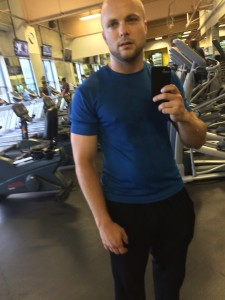How Many Calories to Eat to Lose 10 Pounds
How to lose 10+ pounds of fat a month- even if you have a slow metabolism
![]()

If I had to list three things everyone wants, I'd say:
- We all want more money
- We wish TV shows had fewer commercials
- We want a slimmer waistline.
I can't help you with the first two items on that list- but fortunately, I specialize in helping people lose weight. As it happens, you can slim down, flatten your belly, and fit into your old jeans- and it doesn't have to take years. In fact, it is entirely possible to lose more than ten pounds a month if you know what you're doing.
Just take a look at Xi Ha n , who lost 45 pounds in 5 months, and gained muscle in the process. Or Samantha, who beat Type 2 Diabetes by following a flexible diet and a high-volume exercise program. And then there's Jesse Shand, who lost over 350 pounds with the help of the Bodybuilding.com community.
Losing weight is simpler than you think
At the end of the day, fat loss is just a matter of burning more calories than you consume. Since a pound of fat contains around 3800 calories, losing ten pounds a month requires a caloric deficit of around 1200 calories a day.
To lose fat quickly and safely, and avoid rebound weight gain, you just need to do four things:
- Consume fewer calories.
- Burn more calories.
- Maintain good nutrient partitioning, so that you're losing fat but not muscle mass- this is crucial to preventing metabolic slowdown and rebound weight gain.
- Build the systems and psychology to ensure that you stay consistent with your fitness plan.
This doesn't require a starvation diet. In this article, I'm going to show you exactly how to cut calories without starving yourself, burn more calories without spending hours a day in the gym, and prevent yo-yo dieting before it happens.
1. Eat fewer calories
Count calories and macros. You'll need to track calories and macros (grams of fats, protein and carbs) religiously, at least for the first month. First, use this calculator to determine your body fat percentage- and don't suck in your gut when you measure your waist. Then, use this calorie calculator (be sure to select the lean mass formula) to determine your Total Daily Energy Expenditure.
Your daily calorie targets are 1000 less than TDEE on days you lift weights, and 1200 under TDEE on days you either don't work out, or only do cardio. On all days, eat at least 30 grams of protein with every meal and 10 grams with every snack.
Eliminate sugar and liquid calories. In addition to the obvious culprits, watch for hidden sugars in things like fruit, sauces/condiments, and "healthy" foods such as protein bars.
Drink a lot of water. Staying hydrated is a great idea in general, but dehydration also sends thirst signals to your brain that can get misinterpreted as hunger. Drink at least a gallon of water a day if you're male, or 3/4 gallon if you're female, and have a glass before every meal.
Practice intermittent fasting. Skip breakfast and compress your daily eating into a smaller window of time. If you're a man, fast for at least 16 hours and eat in an 8-hour window every day- noon to 8 PM works best for most people. If you're a woman, fast for at least 14 hours and eat for 10. In either case, this means you're having two small meals and one smaller low-calorie snack each day.
If you're flexible about timing, intermittent fasting is also a useful tool for improving meal quality. When I spent a year backpacking around the world, I would often fast in an ad-hoc manner in order to avoid eating when only crappy food was available, which in turn allowed me to eat more delicious healthy food at other meals.
Eat slowly and stop eating as soon as you're not hungry. There's a delay of up to a half hour between when you eat something and when it makes you less hungry- and that's a half hour in which you can end up eating food your body doesn't need. To make sure that doesn't happen, spend at least ten minutes eating every snack and a half hour on every meal.
Finish your meals in thirds, starting with the veggies, then eating your protein, before finally getting to the carbs. Take 5-minute pauses between each third of the meal to give your brain time to catch up to your stomach. As soon as you no longer feel hungry, stop eating- and don't confuse "not hungry" with "full."
Drink sugar water once a day. This brain hack works by suppressing production of the hunger hormone ghrelin and is a small exception to the no sugar rule above. It was discovered by the late Dr. Seth Roberts, and tested and verified by Drs. Stephen Dubner and Steven Levitt, of Freakonomics fame. Done properly, it has a dramatic appetite-suppressant effect, making your diet much easier to follow.
Once a day, during your fasting period, drink one to three glasses of ice water with a tablespoon of sugar dissolved in each glass. This sugar water should have little or no taste. You should also consume nothing else other than water for an hour before and after doing this- it's important to separate the calorie consumption from any sensation of flavor (usually easiest to do in the evening). Remember to include this sugar in your calorie count.
2. Burn more calories
Make workouts short, intense, and frequent. Work out 5–6 days a week, for 25–45 minutes at a time. I recommend separating your resistance training and cardio workouts.
For weight training, you have two options. 1) 3 days of full-body weight training workouts like these, or 2) 4–5 days a week of body part split workouts like this leg workout. If you prefer to train at home, get a set of resistance bands and learn how to use them, along with a yoga mat, and maybe also a pull-up bar and pair of adjustable weight dumbbells.
For cardio, you also have two options. First, you could do 45 minutes of steady-state cardio, meaning go just as fast as you can sustain for 45 minutes. Second, you could do a much shorter but more intense hurricane sprint workout, which I explain in this article.

Better yet, you can perform a very short bodyweight workout first thing in the morning, as soon as you wake up every day. Doing this in addition to your regular workouts will give you the equivalent of one extra gym workout a week.
Burn more energy as heat. Expose yourself to cold temperatures regularly to make your body burn off more energy as heat. Drink ice water, take cold showers, keep your bedroom cool, or hold an ice pack to your upper back. Eating spicy foods also makes you produce more heat- having a slice of cold cut meat sprinkled with cayenne pepper right before a cold shower can significantly accelerate fat burning.
3. Improve nutrient partitioning
Get moving after every meal. After eating, either take a short walk or spend a couple minutes doing air squats and pushups. This activates the GLUT-4 receptors in your skeletal muscles so that more of the food you just ate goes to your muscles, rather than fat stores.
Sleep at least 7 hours a night. Eliminate all sources of light from your bedroom. Get to bed at least 8 hours before you expect to wake up, and spend the last hour before that relaxing with the lights turned down. When you sleep better, you'll have more energy, and thus move more and burn more calories. Your body will regulate it's appetite better. Your hormonal profile will improve, allowing you to build more muscle and burn more fat, independent of diet and exercise.
No alcohol. Alcohol contains more calories than carbohydrates, disrupts your sleep, and raises estrogen levels so that your body stores more fat. Cut it out entirely until you reach your goal weight.
4. Create systems to make compliance easier
Remind yourself of your mission. Take a set of "before" photos, print them off, and post them somewhere you'll see them every day- such as your bathroom mirror.
Surround yourself with encouraging people. Your social environment has a huge impact on your success, so make sure the people you talk to are encouraging you to stay fit. Ideally, you should have a few friends who are losing weight or have done so in the past. Note that friends who want to lose weight but have never done so may not be supportive- look for successful people who will bring you up with them.
If you don't have friends who can fill this role for you, start taking a fitness class, or talk to people online in places like the Bodybuilding.com forums or reddit. Or better yet, hire a personal trainer, or an online trainer like me.
Keep public logs of meals and workouts. Get a workout app such as JEFIT, GymHero or Bodyspace and record all of your workouts with it. Snap a photo of everything you eat before you eat it. Upload the photos to a dedicated Facebook folder or Instagram account, and post your latest workout stats to Facebook once a week.
Schedule workouts and meal prep times. Keep your workouts in your calendar. Additionally, schedule two blocks of time each week to prepare meals in bulk, so that you have healthy food in the fridge ready to eat at all times. Set reminder alerts to go off an hour before each workout and meal prep, and treat this as work- only a real emergency should stop you from getting it done.
"But this won't work for me! My body is different!"
Yes, it will. It will work as long as you actually do it.
Your body doesn't violate the laws of physics. If you "can't" lose weight, the reality is that you're eating more calories and/or burning fewer than you think you are.
Don't have time to work out? Do 20-minute bodyweight workouts at home, and interval sprints in the street outside your home. You can find the time. You can make the time. Many people are in amazing shape despite working 60+ hours a week, and you can be too.
Worried about hunger? There are a lot of simple tactics you can use to curb your appetite. Drink caffeine in the morning to kill your appetite until lunch, eat a lot of vegetables and protein, drink a lot of water, and make sure to have your sugar water at night. The first few days can be tough, but the hunger goes away a lot faster than you'd think.
Rapid weight loss isn't easy, but neither does it have to be a grueling exercise in self-torture. With commitment and discipline, you can get healthy and build the body you've always wanted- and you can see a difference within weeks, rather than years.
How Many Calories to Eat to Lose 10 Pounds
Source: https://betterhumans.pub/how-to-to-lose-10-pounds-of-fat-a-month-even-if-you-have-a-slow-metabolism-3fc12cf548dc#:~:text=At%20the%20end%20of%20the,around%201200%20calories%20a%20day.